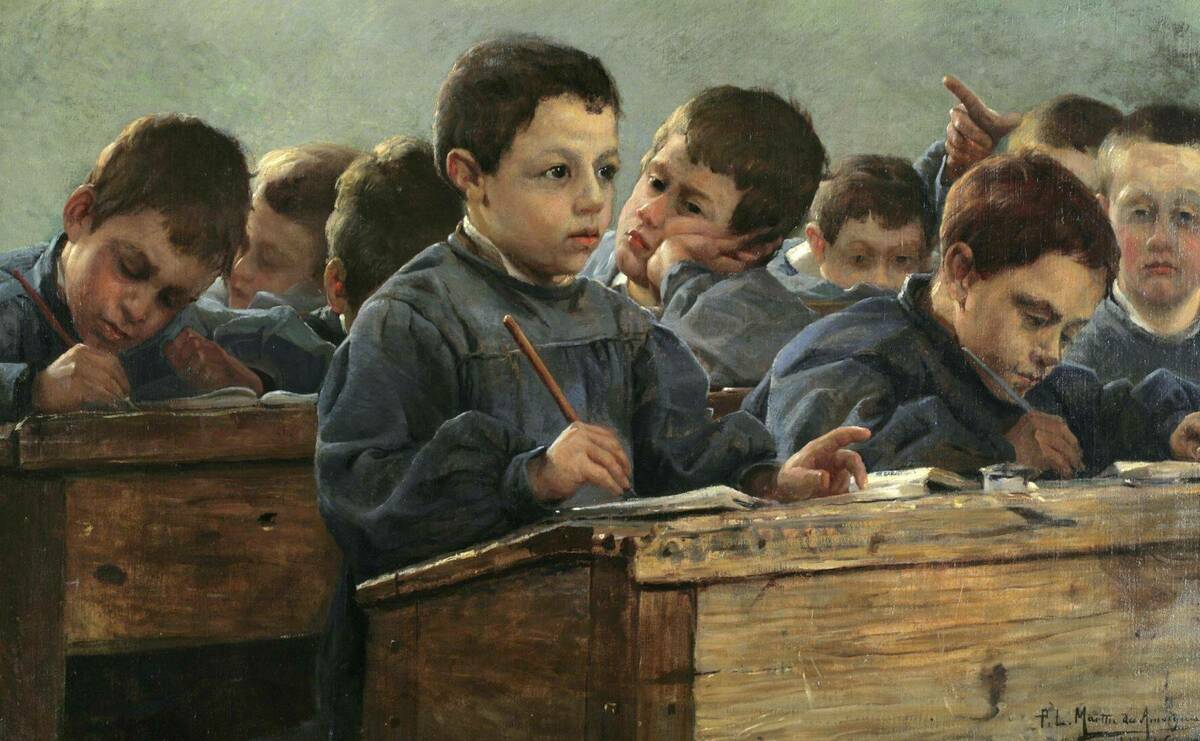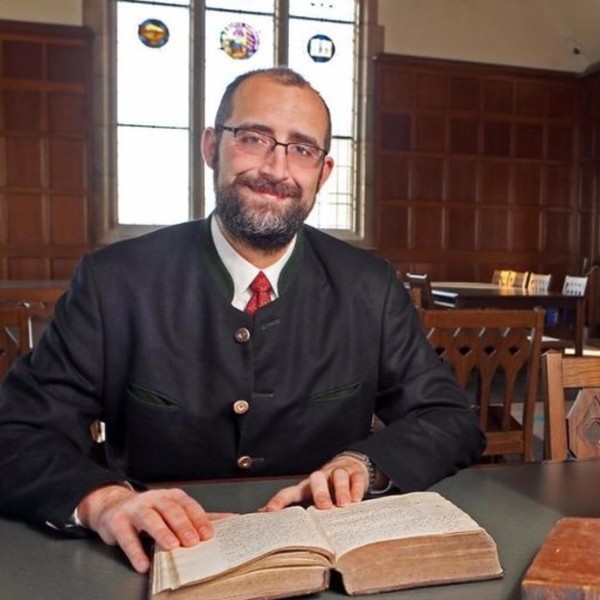Middle school is one of the main battlegrounds of catechesis. It is in fifth and sixth grade that students increasingly become aware of conflicts between what they learn in the sciences and the biblical accounts of creation, but it is also the time when their belief in objective truths is undermined by the constant assault of relativism. Children deserve the truth and I always wondered why we often present the biblical stories first to them as literally true but later tell them that they should be understood “allegorically.” All too often, however, children never get an answer from their parents to a question like: “We learned in school about the Big Bang and evolution. That doesn’t go together with the six days creation story, does it?”
Parents fail to help children grow out of the faith of elementary school and move into the realm of maturity because they themselves have no answer, have never tried to deal with the questions they have on their mind. Certainly, life is busy and often crazy—but we should try not to let the most important questions of life go unanswered: Is there a God? What I can hope for? What is good? A classroom teacher or priest therefore faces on the one side doubting middle schoolers, and on the other parents who have learned much in their lives but never developed the knowledge of their faith. That is a problem because you lose those middle schoolers who are not getting inoculated against relativism, and you cannot reach the parents because either they do not care or are tuning out the existential questions of life.
For many years I have thought about what could be done to help both, teachers, parents and the young minds in high school. In God Is not Nice I have laid out that children need a robust image of God and should not be fed sentimentalist idolatry. They need a God of adventure, of consolation, of humor and life, and not a velvet God, a mental teddy bear or a hippie Jesus. That is, however, only one aspect—the other is that children, parents and teachers have to be able to think better in order to understand not only what the church teaches, but also to see the intelligibility of its teachings. We cannot give primacy to the Logos, as Joseph Ratzinger describes it, without using reason! Christ does not teach nonsense, and he does not teach anything against reason must therefore be a crucial aspect of our classroom endeavor.
Nevertheless, middle schoolers begin to believe just that. For them, church and God become the compartmentalized Sunday-experience, which has nothing to do with what they learn all day and hear at home. God suddenly becomes a fairy tale story but nobody who has to be taken seriously. It is the Santa-Awakening all over! This is hardly surprising. After all, it is in Middle School that students are confronted with full blown relativism. They are told that many people have different ideas of what is good and what is evil. That is certainly true—but at the same time they are fed the lie: “And everybody has his own truth. There is no objective truth.” They are told what their parents regard as good cannot be objectively considered good, and so on. Small minds are easily impressed and most parents I talked with did not preemptively address this at home although they knew that their young ones were taught some form of relativism. Some were unaware of this being part of the school curriculum in public institutions—which is a clear sign that they do not talk enough with their kids!
Enticing better ways of thinking, of critical thinking, is therefore a crucial component of catechesis. In the past one could rely on schools to provide this, but that is no longer the case. In fact, even if every college promises to teach “critical thinking” I believe that most of their administrators and recent alumni could not even remotely describe what that even is. Catechesis does never have to be afraid of critical thinking if it is itself reasonable, and if it is not, it is probably not worth keeping.
These considerations were the reason why I decided to write a small book, which explains in, as I hope, plain language paths to better thinking, bringing order into our minds. I had my own children in mind, but also parents who are not philosophers, teachers, catechists, and priests. Think Better outlines why thinking is crucial not only to find orientation in the world, find truth, but also empathy and mental health. A life of the mind does not mean everybody should become a bookworm or “a nerd”—as my high school sons would say—but rather that we appreciate and form our mental capacities since they too serve our wellbeing and the common good.
Let me give you an example. Every teenager is searching for an identity. It is the perfect window for a catechist to insert the question of Christian vocation, but as it happens so often in our work, we have the answer but the people we talk to have forgotten the question. What is the question which is answered by our beautiful theology of vocation? What is the quests to which the Jesus who knocks on the door of the soul is the answer?[1]
A teenager asks not only What am I? but also Who am I? Perhaps you have experienced what the poet Jean-Paul Richter describes here: “One morning when I was still a child, I was standing on the threshold of the house looking to my left in the direction of the woodpile when suddenly there came to me from heaven like a lightning flash the thought: I am a self—a thought, which has never left me. I perceived my self for the first time and for good.”[2] I do not remember such a single moment, but at some point, I became conscious of my own self and perceived myself as a living unity. Because I am a unity, I am different from everything else. I am my own being, and I am not my brother. I am different from the house I live in, and the food I eat does not make “me.”
This “me” is an ongoing project. I make decisions that shape my life and who I will become. While much of my personality might be determined by my genes, I have the choice to mold myself into the person I want to be. In order to do that, however, I need to know what I want to become, or as Cicero, the ancient Roman politician and philosopher, said: “Above all . . . it has to be established who and what kind of person I wish to be . . . and this is the most difficult problem in the world.”[3]
Here one of philosophy’s most important principles has its origin, the so-called principle of identity. The principle of identity states that a being is identical with itself. This may sound weird or superfluous, but I assure you it is not. We can know things because we recognize things as unities, as individual things. The best analogy I can think of is walking at night. Some ten years ago, I was a visiting professor at Princeton and after a dinner party, I decided to walk home. It was a beautiful spring evening, but the neighborhood did not have any streetlights. As the sun went down, it got very dark, and I tried to find my way home (in vain) until a car pulled up: “Ulrich, do you need a ride?”
I do not think I was ever happier to see a friend stopping to give me a lift! Let’s apply this analogy to the principle of identity: I cannot distinguish objects in complete darkness because I cannot perceive where one thing ends and the other begins. I need some light so that I can discern their boundaries and not become disoriented (or walk down a cul-de-sac!) Because I am “I,” I can identify other things that are not myself and grasp their existence as separate units.
The question of who you are is not just important as you move toward adulthood but remains so throughout life. Remember that after seven years, every cell in your body has been replaced—but nevertheless you are not a different person. Some features might have changed; perhaps my face has more wrinkles, and I am no longer as fast a runner as I was, but I am fundamentally still the same person I was seven years ago. Some substance underneath the cellular changes remained identical. The fact that we even ask ourselves who we are sets us apart from all other animals. As far as we know, only human beings wonder “Who am I?” and try to find their place in society (albeit certainly influenced by instincts). Only humans have to develop a stance toward the world while animals are completely controlled by their instincts. And since we are living organisms, we can conclude that the question about identity and thus consciousness of ourselves as a “self” is only found in living beings.
Life brings us in contact with the world outside our consciousness. When I sip my cup of coffee, I feel the shape of an object different from my body, a smell and taste that is not me. Yet how often do I attentively feel the handle between my fingers or relish the taste of this drink? Only if I become mindful of my surroundings will I really pay attention to influences on my body and self. I learn to appreciate myself as a point of stability in a sea of change and become more perceptive to external influences, as well as my reactions to them.
When was the last time you paid attention to the surroundings of your workplace, its colors and shapes? How do you experience yourself when you encounter these? Such reasoning can make us mindful of the world around us and teach us to appreciate the small things in life while also empowering us to take control of our life. After all, only the person mindful of such influences is able to choose which one she allows to impact her life and which she deliberately rejects as harmful. All this would be impossible without the principle of identity, without the knowledge that “I am I,” because I could not encounter anything as something different from me!
We know the difference between ourselves and other objects, but if we want to know ourselves, we have to objectify ourselves. This means that we have to put the spotlight on our self in order to examine it. When we do that, one of the things we discover is that we are, that we exist. We only know things because they rise out of the dark abyss of nothingness, because they exist (see above: the analogy of a walk at night). The principle of identity demonstrates to us that existence is utterly different from nonexistence, that to be means to have a perfection that non-existing things do not have. A principle that initially looked a bit odd has led us to think about the affluence and “luxury”[4] of our own existence.
Stretch out your hand and feel the object closest to you. In my case, it’s a book lying on my table (my kids say I have way too many books). I can feel the surface of the old, worn dust jacket and smell a hint of pipe tobacco emerging from its pages because the previous owner was a heavy smoker. I see it is approximately 11 inches long, 8 inches wide and about 1.5 inches thick. What do you feel and experience right now? Perhaps a lamp, a laptop, or a desk? Whatever you feel and experience, it is a thing that you cannot manipulate with your mind. No matter how strongly you wish the lamp away or how much you would like to walk through the walls of your office, matter will resist you. Perhaps this sounds awfully silly to you, but I guarantee that it’s not.
This experience of resistance demonstrates two important truths. First, there is a reality outside my mind—something that is not me (which is another application of the principle of identity). Second, this experience shows us that this reality has its own mind, so to speak, because it resists me and is independent from my mind. Perhaps the second truth sounds obvious to you, but since some philosophers have claimed that the world outside our mind does not exist, that we are brains in a tank (remember the movie The Matrix?), or that our mind brings the world into being, this experiment is crucial evidence that these philosophers got it wrong!
As you can see, thinking well is not just for philosophers—far from it! In our world, there are plenty of people who deny realism, which means that they deny that we can gain true knowledge of the real world. Instead of encountering the world and discovering it, they argue that reality should bend to whatever they want it to be. Or think of those who walk through life without any mindfulness for fellow human beings and their environment. They are so distracted by their search for wealth or security, or by staring at screens, that they effectively shield themselves from encountering reality on a more profound level. One can only hope they will one day delight in the liberating experience of realism! Will we, however, teach such realism to our kids or not? If we hope they find their way to it in college, it is too late. They have to be exposed to truth-seeking much earlier.
EDITORIAL NOTE: This is an excerpt from Ulrich Lehner's forthcoming (16 November 2021) Think Better: Unlocking the Power of Reason. It is used by permission of Baker Academic, a division of Baker Publishing Group ©2021.
[1] The following is a condensed excerpt from: Ulrich L. Lehner, Think Better. Discovering the Power of Reason (Baker Academic Press: 2021), 27–31.
[2] See: Jacques Maritain, A Preface to Metaphysics (New York: Sheed & Ward, 1947), 47.
[3] Cicero, De officiis I, 32. (author’s translation).
[4] Maritain, Preface to Metaphysics, 94.


